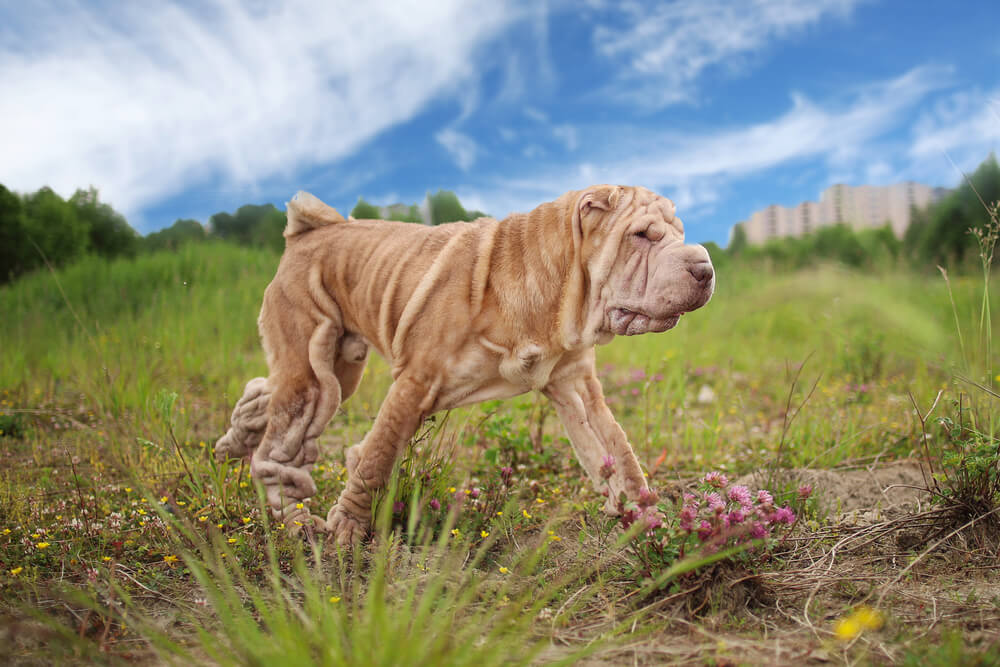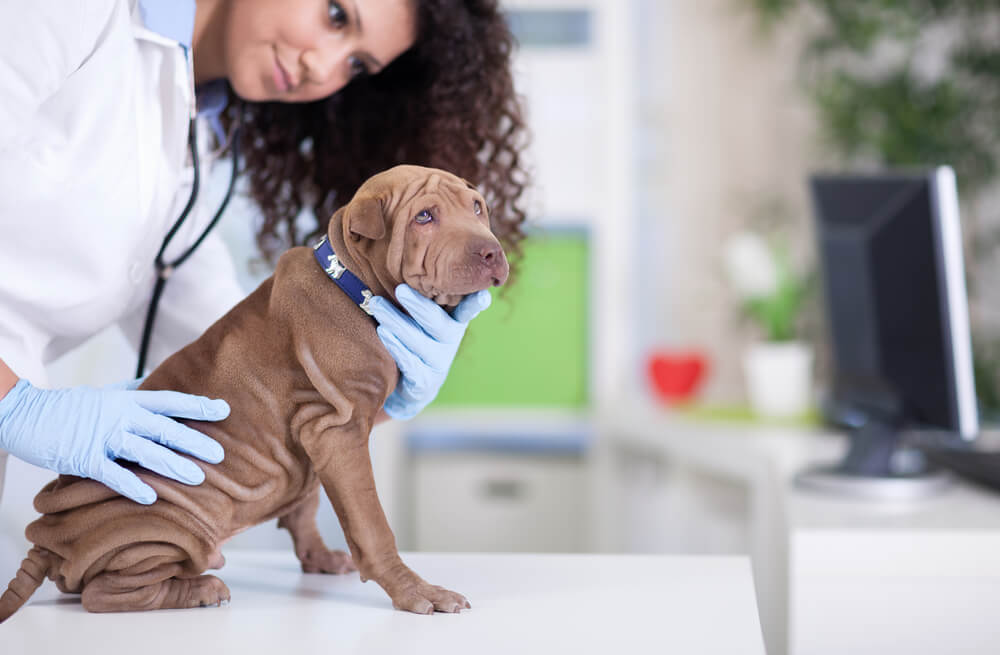The Shar Pei is a unique, ancient breed known for its distinctive wrinkled skin and blue-black tongue. With a life expectancy of 8 to 12 years, these loyal and intelligent dogs make wonderful companions for families and individuals.
Although relatively healthy, Shar Peis can be prone to certain health issues that may influence their longevity. Ensuring a long and healthy life for your pet involves awareness of these issues and following recommendations to reduce risks.
One important way to increase Shar Pei’s life expectancy is through proper nutrition. A balanced diet with the right proportions of protein, carbohydrates, fats, vitamins, and minerals is essential to support their overall health.
High-quality commercial dog food designed for medium-sized breeds or a carefully planned homemade diet, vet-approved, can provide your Shar Pei with the nutrients needed to maintain a healthy weight, support strong joints, and promote a robust immune system.
Regular veterinary care is another key component to improving Shar Pei’s life expectancy. Routine check-ups, up-to-date vaccinations, and preventive treatments for fleas, ticks, and heartworm help protect against common illnesses and infections.
Additionally, early detection of any health concerns can increase the chances of successful treatment and improve your dog’s quality of life.
Health and Life Expectancy

The Shar Pei, a unique dog breed originating from China, is known for its distinctive deep wrinkles and folds. This breed has a strong historical background, tracing its origins back to the Han Dynasty.
Despite its unique appearance and ancient lineage, the Shar Pei can face certain health challenges that may impact its life expectancy. The typical life expectancy of a healthy Shar Pei is around 9 to 12 years. However, various factors can influence the breed’s longevity.
To ensure maximum well-being and increase life expectancy, it is crucial to keep a watchful eye on their overall health.
One way to ensure Shar Pei’s health is through regular veterinary check-ups. Since the breed is prone to specific hereditary health conditions such as entropion, skin infections, and hip dysplasia, early diagnosis, and appropriate treatment can significantly improve their quality of life.
Nutrition plays a vital role in the health and life expectancy of a Shar Pei. Providing a balanced diet with high-quality ingredients can help maintain a healthy weight, reduce the risk of obesity, and prevent related health issues like joint problems and heart disease.
Exercise also contributes to a longer, healthier life for your Shar Pei. Regular physical activity keeps their body in good condition, maintains muscle tone, and supports their mental well-being. However, do keep in mind that their exercise regimen should match their age, size, and individual needs.
Proper grooming is essential for this breed, given its distinctive skin characteristics. Regular baths, using pet-safe shampoos, and routine cleaning of skin folds can help prevent skin infections and irritation.
In sum, a few key factors such as proper nutrition, exercise, grooming, and regular veterinary care can positively impact a Shar Pei’s health and life expectancy.
By providing a supportive and attentive environment, owners can effectively prolong the lifespan of their loyal companions.
Diet and Nutrition
A healthy diet is essential for increasing your Shar Pei’s life expectancy. Providing the right balance of nutrients can not only help with maintaining a healthy weight but also prevent obesity and other diet-related health issues.
Choose a high-quality dog food that is appropriate to your Shar Pei’s age, size, and activity level. These foods should contain the necessary proteins, carbohydrates, fats, vitamins, and minerals that contribute to a balanced diet.
Consider incorporating both dry kibble and wet food options to ensure your dog receives adequate hydration and variety in their meals.
Be aware of your Shar Pei’s specific needs, as some are prone to food allergies. Ingredients that commonly cause allergies in dogs include beef, dairy, wheat, egg, chicken, lamb, soy, pork, rabbit, and fish.
If your Shar Pei shows signs of an allergy, consult your veterinarian for guidance on alternative food options or consider a hypoallergenic diet.
Monitor your dog’s weight regularly to prevent obesity. An overweight Shar Pei may suffer from joint stress, reduced mobility, and shorter life expectancy. To maintain a healthy weight, feed your dog controlled portions and avoid overfeeding.
Measure out their food according to the manufacturer’s recommendations, and adjust the portions based on their activity level.
In addition to a balanced diet, provide your Shar Pei with plenty of fresh water. Water is vital for regulating body temperature, aiding digestion, and supporting overall health. Make sure to clean and refill your dog’s water bowl daily to keep it free from bacteria and debris.
By ensuring your Shar Pei receives the right diet and nutrition, you can greatly contribute toward their overall health and life expectancy. Remember to consult with your veterinarian for personalized recommendations tailored to your specific dog.
Physical Activity and Mental Stimulation

Regular exercise and mental stimulation are crucial for maintaining Shar Pei’s overall health and well-being. Providing your dog with adequate physical activity can help to manage their energy levels, prevent obesity, and contribute to an increased life span.
Shar Peis have moderate exercise needs that can be met through daily walks and playtime. Incorporating at least 30 minutes of physical activity into their daily routine can help to keep their muscles and joints flexible and strong.
This is especially important for senior Shar Peis, as they may be more prone to joint issues, such as arthritis or hip dysplasia.
In addition to physical exercise, mental stimulation is essential for maintaining a vibrant and engaged Shar Pei. Interactive toys and puzzle feeders can help to challenge their cognitive abilities, promoting mental well-being and preventing boredom.
Training exercises, such as obedience or agility, can also provide mental stimulation while strengthening your bond with your dog.
Remember to adapt the intensity and types of activities to your Shar Pei’s age and physical capabilities. To ensure adequate mental stimulation, try introducing new activities and rotating toys frequently to keep your dog intrigued and excited.
By implementing a well-balanced routine of physical activity and mental stimulation, you can contribute to a happier, healthier, and longer life for your Shar Pei.
Grooming and Skin Care
It is crucial to maintain good grooming and skin care for your Shar Pei to ensure their health and longevity. One of the main characteristics of this breed is its wrinkled coat, which, if not cared for properly, can lead to skin infections and other issues.
Regular grooming sessions are necessary to keep the coat clean and free from bacteria. Use a soft-bristle brush to gently remove dirt and debris from the coat, paying special attention to the folds and wrinkles. Brushing also helps to distribute natural oils, promoting a healthy, shiny coat.
Skin infections are a common issue among Shar Pei dogs due to the deep folds in their skin. To prevent such problems, examine your dog’s skin regularly, checking for any signs of redness, inflammation, or discharge.
If you notice any of these symptoms, clean the affected area using a mild antiseptic solution and consult your veterinarian for further guidance.
To keep your Shar Pei’s ears clean and free from bacteria, make sure to check them regularly. Look out for any unusual odor, discharge, or inflammation. If needed, clean the ears using a cotton ball with a dog-approved ear-cleaning solution. Avoid using cotton swabs, as they can push debris further into the ear canal.
Bathing your dog with a medicated shampoo designed for sensitive skin can also help prevent skin issues. It is essential to choose a shampoo that is gentle yet effective in removing dirt and bacteria.
Ensure the shampoo is thoroughly rinsed off to prevent skin irritation. You may also want to bathe your Shar Pei after swimming to wash off any chemicals or contaminants from the water.
Finally, trim your dog’s nails regularly to prevent them from becoming overly long, which can cause discomfort and may even lead to scratching that can exacerbate existing skin issues. Use a pet-friendly nail trimmer, and if you’re unsure about the process, consult your veterinarian or an experienced groomer for guidance.
Common Health Problems
Shar Pei dogs, while known for their distinctive appearance, are also prone to several health problems. By being knowledgeable about these issues, owners can take preventive measures and look for early signs to ensure their dog’s health.
Shar-Pei Fever: This condition, also known as Familial Mediterranean Fever, causes recurring fevers and swelling in the dog’s legs. Keep a close eye on your Shar Pei for signs of fever, lethargy, and joint swelling, and consult a veterinarian if symptoms arise.
Skin infections: Due to their wrinkled skin, Shar Peis can develop bacterial and yeast infections in the folds. Regular cleaning and drying of the skin folds may help to prevent these issues.
Allergies: Many Shar Peis suffer from environmental allergens and dietary intolerances. Symptoms may include itching, redness, and inflammation. Identifying the cause is essential, and treatment may involve a change in diet, bathing with medicated shampoos, or administering antihistamines.
Hip Dysplasia and Luxating Patella: These are common orthopedic issues in Shar Peis, affecting the hip joints and kneecaps respectively. Maintaining a healthy weight and providing proper nutrition during the growth period can help reduce the risk.
Hypothyroidism: A hormonal imbalance leading to reduced thyroid activity, can cause weight gain and lethargy. Regular veterinary checkups can ensure early detection and treatment.
Bloat: This life-threatening condition occurs when the stomach fills with gas and twists on itself, cutting off blood flow. Symptoms include a distended abdomen, difficulty breathing, and vomiting without any production. Seek immediate veterinary attention if you suspect bloat.
Cancer: Shar Peis have a higher risk of certain types of cancer, including mast cell tumors. Regular veterinary checkups and monitoring for lumps or changes in behavior are crucial for early detection and treatment.
By staying aware of these common health problems, Shar Pei owners can better monitor their dog’s well-being and take appropriate action to maintain a healthy, happy life.
Behavior and Socialization

Shar Peis are known for their loyal and affectionate nature, often forming strong bonds with their families. However, their temperament can be reserved and slightly aggressive, particularly towards unfamiliar people and other animals.
With proper socialization and behavior training from a young age, Shar Pei owners can instill the desirable traits and enhance the overall quality of their pet’s life.
Socialization is crucial in preventing Shar Pei from developing unwanted aggressive behaviors. Introducing your dog to different environments, people, and animals should begin during puppyhood. It’s essential to reinforce positive experiences with treats, praise, and playtime.
This helps your Shar Pei associate new experiences with a reward, becoming more comfortable around unfamiliar faces and situations.
In addition to socialization, providing mental stimulation is another key aspect of Shar Pei’s everyday life. Their hunting background makes them naturally inclined to shell out energy.
Interactive games, puzzles, and toys can help them stay mentally sharp and maintain a balanced temperament. Regular exercise will further help in channeling their energy positively, reducing behavioral issues.
Since Shar Peis are devoted and often protective of their owners, establishing a leadership role and setting boundaries is vital.
Using positive reinforcement techniques, like praise and treats, will encourage your Shar Pei to follow commands and respect their owner’s authority. Consistency and patience are necessary components of training a well-behaved and content Shar Pei.
In conclusion, nurturing Shar Pei’s behavior and socialization plays a significant role in increasing their life expectancy. Proper socialization, mental stimulation, and consistent training will not only help in shaping their temperament but also contribute to a happier and healthier life for your beloved pet.
Training and Positive Reinforcement
Training your Shar Pei is essential for their overall health and well-being. By using positive reinforcement techniques, you can help increase their life expectancy and ensure a happy life. This training method focuses on rewarding desired behaviors and ignoring or redirecting unwanted behaviors.
It’s important to start training your Shar Pei from a young age, as they are known for their independent nature. This breed can be stubborn at times, but with consistent training and motivation, they can become well-behaved and obedient companions. Make sure to establish clear boundaries and routines so your Shar Pei understands your expectations.
A common issue with Shar Pei dogs is entropion, an eye condition in which the eyelids roll inward, causing irritation and discomfort.
Proper training can help your dog avoid touching or rubbing its eyes, which can minimize the risk of developing entropion. Regular check-ups with a veterinarian are also essential in keeping their eyes healthy.
Although Shar Peis are not generally aggressive, early socialization is crucial, especially if they will be around children or other animals. Due to their fighting history, Shar Peis have strong protective instincts, making them great watchdogs.
However, teaching them proper social behavior and exposing them to various situations can help prevent territorial aggression.
Living in an apartment is not ideal for a Shar Pei, as they need to be physically and mentally stimulated to stay healthy. This breed requires regular exercise to maintain its ideal weight and height, as obesity can cause health issues, such as diabetes and heart disease.
The American Kennel Club (AKC) suggests daily walks and playtime help maintain Shar Pei’s physical well-being and prevent boredom that can lead to destructive behaviors.
Keeping your Shar Pei’s muzzle and tongue clean is another important aspect of their health. Due to the unique folds and creases on their face, hygiene is essential to prevent infections and inflammation. Regular grooming and check-ups with your veterinarian can help ensure a clean and healthy muzzle.
In summary, training and positive reinforcement play a vital role in increasing your Shar Pei’s life expectancy.
By maintaining a consistent training routine, scheduling regular visits to the veterinarian, and providing proper care for their eyes, muzzle, and overall health, you can significantly improve the quality and longevity of your Shar Pei’s life.
Veterinary Care and Preventive Measures

Regular visits to a veterinarian play a crucial role in increasing Shar Pei’s life expectancy. Routine check-ups help in the early detection and treatment of potential health issues, ensuring your pet’s overall well-being.
Staying up-to-date with medications can significantly improve Shar Pei’s quality of life. Vaccinations, flea and tick preventatives, and heartworm medications should be administered as prescribed by your vet. This will protect your pet from common diseases and parasites.
It is important for pet parents to regularly monitor their Shar Pei’s physical appearance and behavior. Changes in weight, appetite, or energy levels may indicate underlying health issues.
Make sure to address any concerns with a veterinarian promptly to ensure your pet receives proper care.
Ensuring a proper diet for your Shar Pei can also contribute to their longevity. Provide a balanced diet and consider adding supplements to their meals.
Some supplements, such as omega-3 fatty acids and joint support supplements, can aid in maintaining a healthy coat and reducing inflammation. Consult your veterinarian before introducing any supplements to your pet’s diet.
Create a safe environment for your pet by keeping them away from harmful substances and toxic materials.
Common household items like certain plants, cleaning products, and human medications can pose threats to pets. Always store these items out of reach, and be cautious when using them around your Shar Pei.
In conclusion, by following these veterinary care and preventive measures, you are promoting a healthier and longer life for your beloved Shar Pei.
Regular veterinarian visits, timely medications, monitoring changes in behavior, providing a balanced diet, and ensuring a safe environment can significantly contribute to your pet’s longevity.
Conclusion
In order to increase Shar Pei’s life expectancy, it is essential to prioritize their overall health and well-being. A well-balanced diet, regular exercise, and routine veterinary care will contribute significantly to the longevity and quality of life of your canine companion.
Maintaining a healthy weight is crucial for Shar Peis, as obesity can lead to numerous health issues. Feeding a high-quality diet in appropriate portions, coupled with daily exercise, will help your furry friend stay in shape.
Regular grooming and skin care are also important for this breed, as they are prone to skin conditions. Weekly brushings and bathing when needed will help to prevent allergies, infections, and other skin issues.
Mental stimulation is another essential factor in keeping your Shar Pei happy and healthy. Provide interactive toys, enrichment activities, and socialization opportunities to keep their mind sharp and engaged.
Finally, do not underestimate the importance of routine veterinary check-ups. Early detection and treatment of health issues can make all the difference in extending the life of your cherished pet.
Incorporating these tips into the daily care of your Shar Pei will not only contribute to their longevity but will also enhance their overall quality of life, ensuring many happy years together.
Frequently Asked Questions
What are the best nutrition guidelines for Shar-Peis to ensure their health?
To maintain a healthy Shar-Pei, provide a balanced diet with high-quality dry dog food. The portions should depend on their age, weight, and activity levels. It’s essential to avoid overfeeding, which can lead to obesity. Feeding them at regular intervals and providing clean water is also important.
What common health issues do Shar-Peis face and how can they be prevented?
Shar-Peis are prone to health conditions such as hip dysplasia, entropion, skin infections, and allergies. To prevent these issues, maintain a routine vaccination schedule, groom their coat regularly, and keep their folds clean and dry. Providing a nutritious diet and monitoring their weight can also minimize these risks.
Do Shar-Pei mixes have longer life expectancies?
Mixed breed dogs, including Shar-Pei mixes, may have a longer life expectancy than purebred Shar-Peis due to genetic diversity. This factor may reduce the risk of breed-specific health issues.
However, it’s essential to note that each dog is an individual and genetics play a significant role in determining their overall health and lifespan.
How can regular exercise improve Shar-Pei’s life expectancy?
Regular exercise is vital for Shar-Pei’s physical and mental health. It helps maintain a healthy weight, supports joint and muscle strength, and reduces both anxiety and boredom. Exercise also promotes better digestion and cardiac health. Ensure your Shar-Pei gets daily activities, such as walks, games, and mental stimulation using puzzle toys.
What steps can be taken to manage Shar-Pei aggression issues?
Shar-Pei dogs are known to be territorial and protective. Proper socialization from an early age can help manage their aggression issues. Use reward-based and positive reinforcement training methods.
Teach them to respond to basic commands, and expose them to people, dogs, and diverse situations. In some cases, a professional dog trainer or behaviorist may be necessary.
How often should a Shar-Pei visit the veterinarian for checkups?
Regular veterinarian checkups are crucial for Shar-Peis’ health maintenance. Adult Shar-Peis should visit the vet at least once a year, while puppies may require more frequent visits, around every 3-4 months.
These checkups help detect and prevent potential health issues. Keep your dog’s vaccinations, dental care, and parasite control up-to-date.














